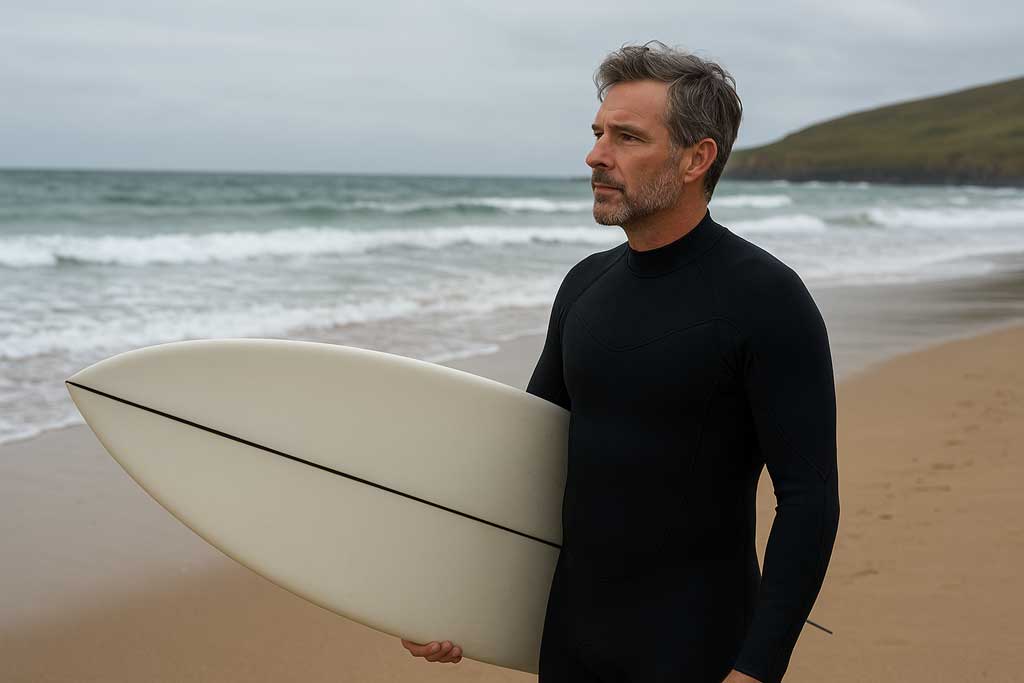There’s actual science behind that incredible feeling people get after their first surf lesson. Here’s why students become instant surfing addicts (and it’s not just the adrenaline).
Anyone who’s spent time around Newquay’s beaches has probably witnessed it – groups of people walking up from the water after surf lessons, still dripping with seawater, faces glowing with something that goes way beyond simple satisfaction. They’re chattering excitedly, high-fiving each other, and planning their next session before they’ve even peeled off their wetsuits.
What observers are witnessing isn’t just the aftermath of a fun activity. It’s the result of a perfect psychological storm that happens when humans connect with the ocean in a meaningful way. Understanding why surfing school newquay students leave feeling so euphoric reveals something fascinating about how human brains work.
The Neuroscience of Flow States
When someone is balanced on a surfboard, waiting for the right wave, something remarkable happens in their brain. All the mental chatter – work stress, relationship worries, that thing they forgot to do yesterday – simply vanishes. They enter what psychologists call a “flow state.”
This isn’t just relaxation; it’s a neurological shift. Brain scans show that during flow states, the prefrontal cortex – the part responsible for self-criticism and overthinking – actually downregulates. Meanwhile, areas associated with focus and pattern recognition light up like Christmas trees.
“Students often tell me they’ve never felt so present,” explains cognitive psychologist Dr. Sarah Mitchell, who studies the effects of ocean-based activities. “That’s not coincidence – it’s biology. The ocean demands complete attention, creating perfect conditions for flow.”
This explains why that first successful ride feels so incredible. Students aren’t just standing on a board; they’re experiencing a natural high that comes from optimal brain function.
The Cold Water Advantage
Here’s something most people don’t realise: that shock of cold Cornish water isn’t just a wake-up call – it’s medicine. Cold water immersion triggers the release of norepinephrine and dopamine, natural mood elevators that create lasting feelings of wellbeing.
Research from Portsmouth University shows that regular cold water exposure can be as effective as some antidepressants for mood regulation. Students often report feeling energized and positive for hours after their lessons, and this isn’t just psychological – it’s biochemical.
The cold also forces what researchers call “present moment awareness.” When someone is in 14-degree water, their brain stops worrying about tomorrow’s meeting and focuses entirely on the here and now.
Achievement Psychology in Action
Surfing provides something increasingly rare in modern life: clear, immediate feedback on efforts. In the digital world, success is often abstract – likes on social media, numbers on spreadsheets, progress toward distant goals.
But catching a wave? That’s concrete, immediate, and undeniable. The brain recognizes genuine achievement and rewards it with a hefty dose of dopamine. This creates what psychologists call a “mastery experience” – proof that people can learn, grow, and succeed at something challenging.
The progression is perfectly calibrated too. Each lesson builds on the last, providing regular achievement milestones. This sustained sense of progress triggers the same psychological mechanisms that make video games addictive, except the rewards are real and the benefits lasting.
Social Bonding Through Shared Challenge
There’s something uniquely powerful about sharing a challenging experience with strangers. Group surf lessons create instant communities through what psychologists term “collective effervescence” – the euphoric feeling that comes from synchronized group activities.
When a lesson group cheers someone’s first successful ride, oxytocin floods their system. This “bonding hormone” creates genuine connections and positive associations with the entire experience. It’s why many students form lasting friendships and why solo travelers often choose group lessons over private instruction.
The shared vulnerability of learning something new, combined with the natural high of ocean activity, breaks down social barriers in ways that normal interactions can’t match.
Overcoming Fear = Confidence Boost
Every surf student faces fear – of falling, of waves, of looking foolish. Confronting and overcoming these fears creates what psychologists call “mastery experiences,” which fundamentally change how people view their own capabilities.
When someone successfully navigates their first wipeout and comes up smiling, their brain updates its assessment of what they can handle. This confidence boost transfers to other areas of life, explaining why surf students often report feeling more resilient and capable weeks after their lessons.
The controlled nature of professional instruction is crucial here. Students face genuine challenges within a safe framework, creating the perfect conditions for confidence building without overwhelming fear.
The Mindfulness Effect
Surfing is meditation in motion. Reading waves requires complete focus on natural patterns and rhythms. Timing the paddle requires present-moment awareness. Maintaining balance demands constant micro-adjustments based on immediate sensory feedback.
This natural mindfulness practice activates the same neural pathways strengthened by meditation, reducing cortisol levels and promoting mental clarity. Students often report that the calm focus they develop in the water carries over into daily life.
Why the High Lasts
The psychological benefits of surf lessons extend far beyond the immediate session. The combination of physical exercise, achievement, social connection, and mindfulness creates a powerful cocktail of positive neurochemicals that can influence mood for days.
Add in the photos and videos capturing triumphant moments, and students have visual anchors that allow them to relive the positive emotions long after leaving the beach.
This explains why surf schools see such high return rates and enthusiastic referrals. It’s not just that surfing is fun – it’s that the experience creates lasting positive changes in how students feel about themselves and their capabilities.
The science is clear: that post-lesson buzz isn’t just excitement – it’s the brain celebrating optimal functioning, genuine achievement, and meaningful connection. No wonder everyone leaves absolutely buzzing.



